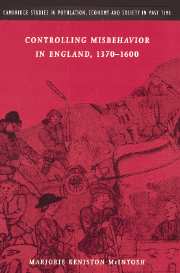Book contents
- Frontmatter
- Contents
- 1 List of illustrations
- 2 List of tables and lists
- Acknowledgements
- List of abbreviations
- Introduction
- Part I The history of social regulation
- 1 The forms of control
- 2 Methodological underpinnings
- 3 Social regulation in England's smaller communities
- 4 Social concern in other contexts
- Part II Factors that influenced social regulation
- Conclusion: social regulation and the transition from medieval to early modern England
- Appendices
- Bibliography
- Index
- Cambridge Studies in Population, Economy and Society in Past Time
4 - Social concern in other contexts
Published online by Cambridge University Press: 23 November 2009
- Frontmatter
- Contents
- 1 List of illustrations
- 2 List of tables and lists
- Acknowledgements
- List of abbreviations
- Introduction
- Part I The history of social regulation
- 1 The forms of control
- 2 Methodological underpinnings
- 3 Social regulation in England's smaller communities
- 4 Social concern in other contexts
- Part II Factors that influenced social regulation
- Conclusion: social regulation and the transition from medieval to early modern England
- Appendices
- Bibliography
- Index
- Cambridge Studies in Population, Economy and Society in Past Time
Summary
While we have obtained a good picture of how and why juries in the lesser public courts responded to social wrongdoing, we do not yet know to what extent their attitudes and actions reflected more widely held responses. Were the concerns of those jurors in some way specific to that context, or have we opened up a window that sheds more general light upon the opinions of respectable local people? How, that is, do the records of the lesser courts fit within a broader social context? To examine these questions, we begin by looking at textual statements and punishments from the three additional types of courts that operated at the lower and intermediate levels of the system of English justice: urban bodies, the church courts, and Sessions of the Peace. These reinforce the argument made in Chapter 1 that the various courts worked in partnership to address wrongdoing, based upon common attitudes about harmony, order, and the problems of poverty. We then turn to two very different kinds of texts: the foundation documents and ordinances of almshouses and hospitals established during the fifteenth and sixteenth centuries, and petitions submitted to the Lord Chancellor of England that contain descriptions of misconduct. The latter are of particular interest due to the specificity of the incidents described and the individuality of the language employed. These sources show that the attitudes and terminology seen in court records were shared by many people, underscoring the point that attempts by legal institutions to limit wrongdoing formed only one component within a wider effort to regulate misbehavior. Nor was acute concern with misconduct by any means limited to ardent Puritans.
- Type
- Chapter
- Information
- Controlling Misbehavior in England, 1370–1600 , pp. 108 - 124Publisher: Cambridge University PressPrint publication year: 1998

